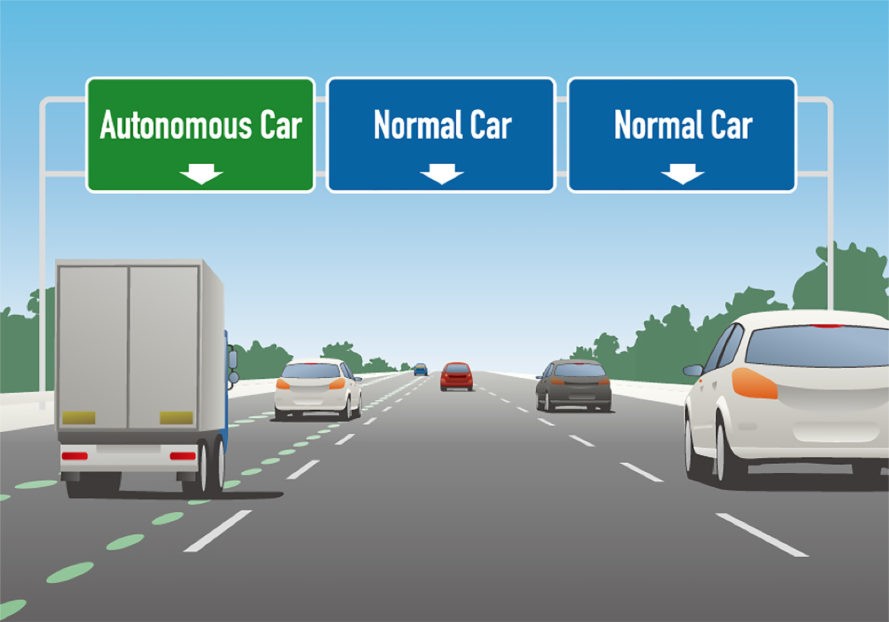 Photo: Madrona Venture Group
Photo: Madrona Venture GroupHumble Wisconsin could be the first state in the US to have a public road equipped with a dedicated lane for unmanned vehicles. Such intentions from local authorities appeared after the electronics industry giant Foxconn Technology Group announced plans to build a mega-factory in Racine County,
the local edition of
Milwaukee Journal Sentinel writes .
To date, unmanned vehicles are run-in at test sites and public roads in several states (on the roads, almost everywhere, always with an insured driving driver). But in no other state have they made a special dedicated lane for unmanned vehicles, although this seems like a rather logical and reasonable idea.
Tom Sheehy (Tim Sheehy), President of the Milwaukee Chamber of Commerce at a meeting of the Greater Milwaukee Committee Committee on November 13, 2017, spoke about the possible re-equipment of I-94. He called it one of the potential challenges facing state authorities in anticipation of the construction of the Foxconn factory.
Tom Sheehy explained that after the opening of the factory, we can expect an increase in traffic intensity along I-94, as during the rush hour a huge mass of workers would go to the factory - up to 13,000 people.
The plant itself will be located 13 km west of the county administrative center, the city of Racine, and 32 km from the center of Milwaukee.
As it should be, the authorities are preparing in advance to change the traffic situation. Highway I-94 is planned to expand to eight lanes. In addition, other local roads that are expected to increase in load will be improved.
Tom Sheehy said that he and other officials went to meet with Foxconn management - and reported on the work done and how the state is preparing for the arrival of big business. "And we were dumbfounded," said Sheehy, "when they looked at us and asked:" And where is the lane for driving unmanned vehicles? ""
It turned out that for advanced Taiwanese this is almost a natural requirement. Of course, the state authorities immediately instructed the relevant departments to work on this issue. Now planning a dedicated band for robo cars in Wisconsin is the regional division of the US Department of Transportation.
A ministry official confirmed that the issue is really being worked out not only for I-94, but also for other roads near the planned Foxconn complex near the village of Mount Pleasant. But the process is not so simple: they say that many factors must be taken into account and evaluated.
One option is to organize a direct lane for the drones on the highway between the Foxconn factory and the International Airport. Mitchell in Milwaukee. This will greatly facilitate logistics for the delivery of goods, which in the future will be automatically delivered along the highway from the airport directly to the factory. In principle, it is possible to automate the loading and unloading of goods, and together with the future full automation of assembly production, such factories will someday be able to work fully automatically.
As you can see, the Foxconn management plans in advance the future development: “We are planning two years ahead, and they are planning 20 years ahead,” said Tom Sheehy.
Racine is a small district in the south-east of the state with a population of 195,000 people. It is located not far from Milwaukee and Chicago at Lake Michigan. If Foxconn had developed the same mega-production as in Taiwan, then all adult residents of Racine County could get a job at its mega-factory. At least in Taiwan, Foxconn factories employ 727,000 people (data for 2016). But Foxconn does not intend to open in America the same "anthill": for sure production will be much better automated, and the number of employees is limited to the "modest" 13,000 people.
Foxconn is planning a high level of production automation - the company
announced in 2016 a
plan to replace 60,000 workers on a conveyor belt with robots . Given that in the same China, average wages have already exceeded $ 740 per month (45,000 RUB equivalent), and Foxconn workers receive more than the average, transferring production to Western countries does not seem to be such a bad idea. Local assembly production can save on import duties, so that the cost of electronics in the case of automated assembly production in Wisconsin may be even lower than when imported from China to the United States.
Building a mega-factory in Wisconsin will cost Foxconn $ 10 billion. For it, the government provides government incentives and benefits for $ 3 billion, plus infrastructure and other government expenses for $ 764 million. It is assumed that they will produce ultra-high resolution LCD panels.
Apparently, dedicated lanes for unmanned vehicles can become commonplace when robo cars allow for movement on ordinary roads. For example,
Madrona Venture Group offers equipment of the same lane on I-5 between Seattle and Vancouver.